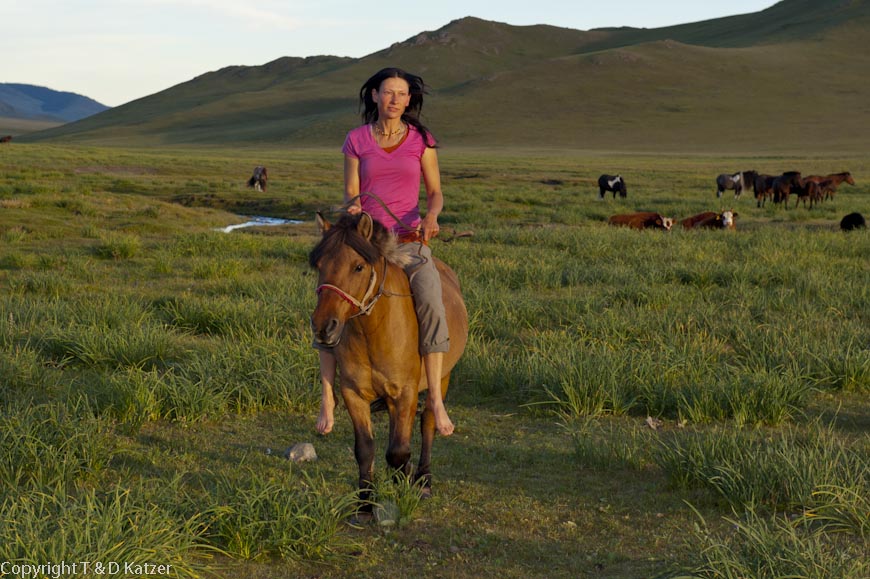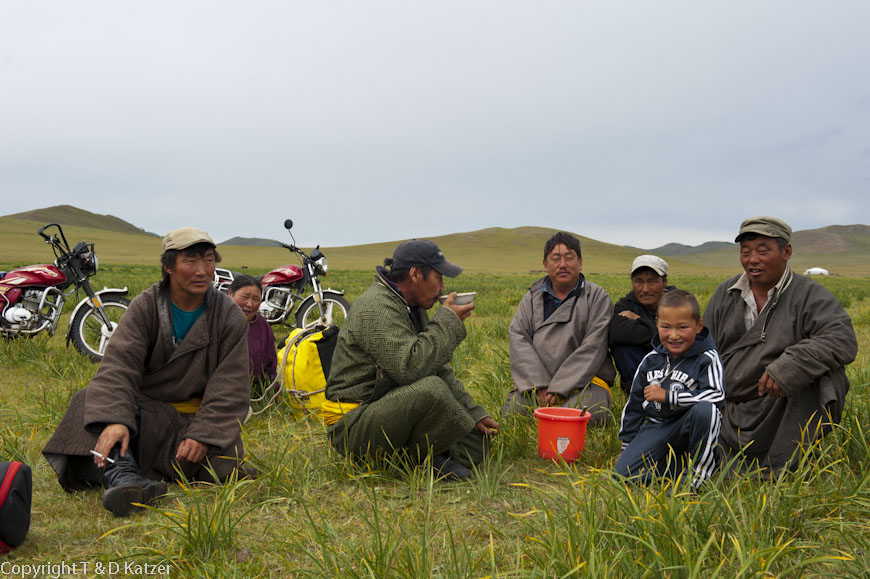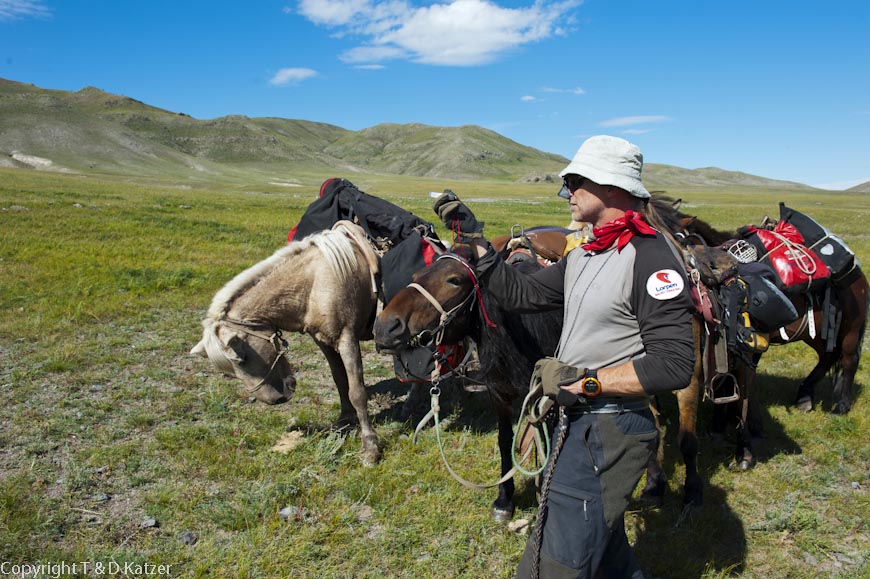
Horse meat, a bloody nose and a nocturnal visitor
N 48°56'367'' E 102°03'951''
Day: 400
Sunrise:
06:21
Sunset:
20:04
As the crow flies:
20,24
Daily kilometers:
25
Total kilometers:
2298
Soil condition:
Grass/stone
Temperature – Day (maximum):
25 °C
Temperature – day (minimum):
18 °C
Temperature – Night:
minus 3 °C
Latitude:
48°56’367”
Longitude:
102°03’951”
Maximum height:
1700 m above sea level
Time of departure:
1.00 p.m.
Arrival time:
5:00 pm




Despite yesterday’s Mongolian food and drink cocktail, I made it through the night without any further incidents. I feel a bit sick to my stomach, but that will certainly change on today’s riding day. We have just finished packing when Shinooder comes riding up. “Before you ride, you have to fortify yourselves. Nirgui has cooked especially for you,” he invites us into his yurt for a meal. I don’t let the shock show. “I still have to tie the ropes around the duffel bags, then we’ll be there,” I reply as Tanja grins knowingly at me. Shinooder gets out of the saddle and helps us with the rope work. More men rattle up on their motorcycles and join them. Obviously word of our imminent departure has gotten around the valley. The heavily intoxicated shepherds sway from their Chinese rattletraps and sit down next to us. “You have to come with me. We live on a beautiful lake,” says one of them. “Where is your yurt?” I ask. “There,” he slurs, pointing in the opposite direction to our destination. “Oh, but we have to go to Erdenet,” I object. “That doesn’t matter. Just one day, you have to come to me for one day,” he demands. “I’m sorry. We have to go the other way.” “It doesn’t matter which direction. It’s nice here. Very nice.” “I believe you, but we would very much like to continue our ride to Erdenet. If we stay in the area any longer, winter will surprise us again,” I try to argue without any success. “Oh no! What’s one night?” I smile good-naturedly at the man and persevere. When the equipment is ready for loading, we grab our saddlebags in which the video cameras, cameras and other expensive equipment are stowed. “Get on”, the drunken Mongolian asks me to sit on his trestle. Since a refusal would be tantamount to an insult, I get on. Tanja is also picked up by one of the steppe bikers and driven to the yurt.
As we enter the felt tent, we are greeted by many people. The yurt is filled to the brim, so to speak. As usual, we are given the place of honor from which some of those present move to give us their seats. As soon as we have settled down on the small wooden stools, Nirgui hands us each a bowl of noodle soup with lots of meat. “What kind of meat is that?” Tanja asks. “Horse” “Oh horse. Tastes good,” we reply, although I have to admit I’m not being sincere. “Eat more. Eat more,’ she urges us. Even if we can hardly detect any difference in taste to cow meat, the mere fact of eating our horse friends takes some getting used to. Nirgui has added plenty of sunflower oil to intensify the flavor of the soup. After the first bowl I can already feel the fat being pumped from my stomach into my veins.
“You have to come with me to my yurt,” the drunken shepherd slurs at me relentlessly. “We’re riding south-east. But when we come back, we’ll visit you.” “No, no, you must visit me now. Today is a bad day to travel on. Not a good omen,” he says, to which others nod their heads in confirmation. Since we already know from the Tuwa that there are good and bad days of travel for every family, we believe the man. Nevertheless, his bad travel day has nothing to do with us. “If we stuck to it, we’d have to stay in Mongolia for another year,” I say to Tanja.
By now, many of the guests are talking to us in loud voices. Only because we have been in this country for so long do we know that people are not shouting at us but talking to us in a relaxed mood. “Stay one more day!” “No, they shouldn’t stay but come to me!” “Ha, ha, ha! Hi, hi, hi!” is the general comment. “That one over there is Russian!” “No, I’m not Russian!” But you are Russian!” “I’m Mongolian!” “No, you’re Czech!” “No, no, no, I’m Mongolian!” a drunken relative of Gangsuch defends himself with even more boisterous laughter. “We’ll give you to the two of them,” he teases the five-year-old Gangerden. “Ügüj, ügüj, ügüj,” the little boy replies aggressively. “Yes, but yes. You’re going to Germany with me,” the man teases him further. “Ügüj!” he roars, jumps up, pulls the man’s hair and slams his elbow on his nose with full force, causing blood to flow instantly. As a Mongol shows no pain, the man, apparently his uncle, wipes the blood into the sleeve of his deel without comment. Gangerden, still beside himself, takes advantage of his inattentive uncle’s time to attack him again, leaving him speechless. None of the adults intervene and everyone lets the little one have his way. I stare in amazement at the injured big man, who ignores the incident with an agonized laugh. After Gangerden has almost knocked his uncle out, he curls up on his father’s lap again.
Then a bottle of vodka is decapitated. We sip. The usual program of offers comes crashing down on us. “You have to come with me to my yurt!” “Now leave him alone!” a very corpulent woman yells. “Ha, ha, ha, hi, hi, hi,” the audience laughs boisterously. We take a few more photos to everyone’s delight. Then we can break away. None of the yurt occupants want to miss our departure. They follow us to the horses and luggage. Six helping hands let the heavy sacks fly onto the horses’ backs. “Come on. Drink some airag. It will fortify you for the long ride,” we are invited again. One of the women carried a whole bucket full of fermented mare’s milk to our camp site. A scoop rushes in and pumps the white, sour yoghurt-like liquid into a bowl, into which everyone sticks their noses, of course, and I can also see my uncle’s bloody one disappear behind the edge of the bowl. We take a big sip. Then we swing into the saddles. “Sain jawaaraj!” (Have a good trip), the wishes waft from many mouths to our ears. “Thank you so much for the fantastic hospitality!” we say to each other and wave to the festival community who are now lying on the grass and trying to empty the bucket.
Our well-behaved and loyal animals immediately break into a trot. We make rapid progress. It doesn’t take long for my stomach to rebel. I accept the price of exceptional hospitality as calmly as possible. We cross extensive grassy areas and a sea of scree. Sharga, Tenger and Bor eat from the rich grass, lush colorful flowers and thistles while trotting. Apparently a culinary and exclusive mix. Tenger can’t get his throat full and chokes. Suddenly, while running, he keeps throwing up half-digested food in large fountains into the air. In the first few moments, I hardly notice, but as he becomes increasingly slower and more sluggish, I start to worry. “I don’t think Tenger is well,” I shout to Tanja. “What’s wrong with him?” “I wish I knew. But either he got the grass down his wrong gullet while running or he got something bad or maybe even poisonous,” I reply, thinking about how our lead camel Sebastian contracted severe poisoning from plants at the end of the Australian expedition, from which he eventually died. “Is today really a bad day for traveling?” I ask myself after Tenger starts sweating profusely and has difficulty keeping up with his companions. A brown, viscous broth oozes from his nostrils at regular intervals.
To our right lies a large lake in a wide valley. My GPS points to a pass that we rode over last year. On the other side, there was a spring with fresh and holy water. “Is it still far?” asks Tanja. “Only three kilometers to go,” I reply. As we walk cross-country, deep, stony trenches run through the mountainside again and again. Carefully and carefully we overcome the obstacles until we reach the ridge and our gaze glides into a seemingly endless valley. “The land where your eyes don’t bump anywhere,” says Tanja enthusiastically. “That’s where the spring is!” I shout, pointing to a memorial stone where a monastery was built a few decades ago, which was razed to the ground by fanatical communists and its monks were abducted and killed.
Not far from the spot where we were caught in a snowstorm last September, we unload the horses and water them at the spring. Tenger refuses to take in any food or fluids. The lava-like substance is still drooling from his nostrils. “Doesn’t look good,” says Tanja. “Not good at all. I think he has colic. In that case, it was good to have kept him moving. That should help in the event of colic. We have a medicine for colic, don’t we?” I ask. “Yes. Do you think we should give it to him?” “Absolutely. If not now, then never,” I decide, still wondering whether we shouldn’t have accepted the invitation from the pushy shepherd. While Tanja Tenger holds the lead rope, I press the first dose of the herbal mixture into his mouth with a syringe. Tenger spits a little. But he swallows most of it. “He’ll get his second dose in an hour,” says Tanja. “I hope the medicine gives him relief,” I say thoughtfully. “That will help. I have a good feeling.”
As our tent is at the foot of a rock face at an altitude of around 1,700 meters and there are no trees or bushes blocking the view into the valley, it is certainly easy to see. Especially by shepherds who constantly watch their flocks through binoculars or half of a pair of binoculars, which we call one-eye. “It won’t be long before we have visitors,” I suspect. According to my plan, we only wanted to set up camp near yurts or in hidden places. This is the only way to be safe from horse thieves and possible robberies. I don’t want to overemphasize the horse-thief issue, but we have to be on our guard until the end of our journey. As far as robberies in Mongolia are concerned, Tanja and I agree that we would have to be very unlucky to get into such a situation. Saraa and other tour guides told us about this, but we are convinced that it is very much about scaring the foreigners. If you have fear in your bones, you will never travel without guides. And guides and horsemen live from and through tourists. Well, we’ll see how the rest of our unique journey through this wild and fascinating country goes without a Mongolian escort.
“10:30 p.m.” Tanja is on watch shift. The rattle of a moped can be heard. “Will it come to us?” whispers Tanja, as if the people on her crate could hear her words. “Sounds like it,” I reply, feeling the adrenaline rush through my veins. I immediately reach for the pepper spray and the tracer pen. “You’re going to the source,” says Tanja. “At this time of night? Strange.” Arriving at the spring, the vehicle turns in our direction and stops right in front of our tent. We greet the two men as they get off the trestle and make themselves comfortable in the awning without being asked. She bends her legs so that they don’t sit on Tanja’s feet. “They’re drunk,” I tell Tanja warningly. As hospitality demands, Tanja offers the men sweets and apologizes for not having hot water for tea at this time. The men laugh and take a few sweets. While Tanja talks to them in a relaxed chatty tone, I watch them suspiciously, ready to defend myself at the slightest aggression on their part. “I think they’re harmless,” says Tanja. “That may be. But they’re drunk,” I reply. “Come to our yurt. It’s not good here,” we understand. “Where’s your yurt?” asks Tanja, to which the co-driver points into the valley below us. “Tomorrow. We’re too tired today. It’s too time-consuming to break camp and load the horses,” she explains. The men are not initially satisfied with the answer. “You have to get out of here,” says the driver with a serious expression on his face. “Excuse me? I don’t understand. Sorry, we hardly speak Mongolian,” Tanja replies, embarrassed by the tactic of not understanding. The men vacillate between friendliness and certain unfriendliness. When Tanja continues to pretend not to understand, they get up, climb onto their rusty plane and disappear into the dark night. “Oh man, these visits can really get you down,” I groan, sinking back onto the sleeping mat. “Did you understand what they wanted?” asks Tanja. “I don’t think they wanted us to camp here. Must be a sacred place somehow.” “Yes, I understood that too.” “We definitely have to get going tomorrow. Hope Tenger is back on the dam tomorrow,” I reply. “Half-digested food is still coming out of his nostrils,” says Tanja, pointing the beam of her headlamp at the suffering horse. “Did you give him the medicine again?” I want to know. “Yes, twice.” “Let’s pray that Tenger doesn’t die at the end of the journey. That would be fatal in this lonely area,” I say.
I spend the rest of the night in a restless waking sleep. Nightmares of robberies and horse thieves plague me. I keep jolting up and listening into the blackness of the night. Tenger is still choking and farting. “Please God, if you really exist, let Tenger be fit again tomorrow,” I pray, listening to the many sounds of the wilderness.
We look forward to your comments!

